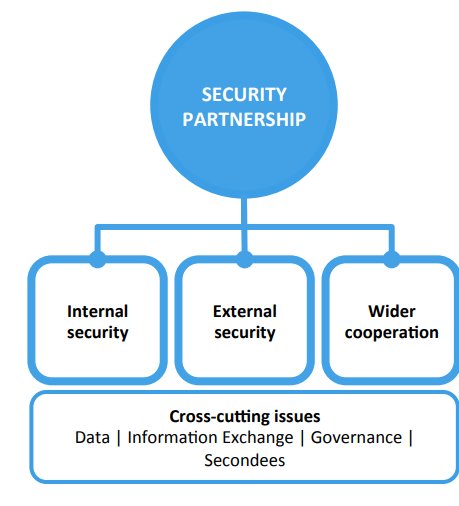The British government has published the slides on the post-Brexit security partnership, which it presented to the EU last week.
(Thread)
assets.publishing.service.gov.uk/government/upl…
(Thread)
assets.publishing.service.gov.uk/government/upl…
Slides are split into 'internal security' and 'external security', with cross cutting issues data/information exchange; governance; UK<->Eu secondees.
I'll refer you to my colleagues @CaminoMortera @CER_IanBond for JHA &foreign policy questions; a few points on defence from me:
I'll refer you to my colleagues @CaminoMortera @CER_IanBond for JHA &foreign policy questions; a few points on defence from me:

Spoiler: none of this should be particularly surprising, especially if - shameless self-promotion - you've read my recent policy brief on the topic: cer.eu/publications/a….
(Except that my policy brief also points out where and how these UK demands might not work out.)
On CSDP, the UK offers to contribute to missions& ops on a case-by-case basis, with niche capabilities& with troops. It offers to continue to share classified info, to support EU planning. It offers to pay into financing of ops (common& mission-specific), when it participates.
On the critical question of UK involvement in planning: Britain thinks its involvement should be 'scalable and commensurate' to its contribution - i.e. the more troops and assets the UK offers the EU, the more closely and the more early on it should be involved.
(Slides acknowledge that the EU might want to reform its involvement of third countries in defence planning. More about this - you guessed it - here: cer.eu/publications/a… )
On capability planning: the UK wants an 'ambitious' (read Norway, not Ukraine) Administrative Agreement with the EDA; to participate in the defence planning process (i.e. CARD); and even a permanent liaison to EDA.
Note also: "For UK contributions to programmes to deliver mutual benefit, the UK would require access to both sensitive information and commercial opportunities". This may have been inserted post #Galileo spat....
The UK wants to "keep open the option" to participate in PESCO projects, and it wants to participate in the #defencefund - both in research AND in development strand. (--> Why this will be problematic: p.11 cer.eu/publications/a… )
Finally, #Galileo. This is where the slides, unsurprisingly, become not-so-passively-aggressive.
The UK wants not just access to PRS user data, it also wants its firms to be able to continue to produce the tech that goes into the system.
The UK wants not just access to PRS user data, it also wants its firms to be able to continue to produce the tech that goes into the system.
Read my piece 'A hitchhiker's guide to Galileo and Brexit', to understand why this is so controversial: cer.eu/insights/hitch…
In the piece I argue that the fight over Galileo risks souring security negotiations between UK and EU.
The UK gov seems to agree: UK cooperation on Galileo is "an important test case" of the future depth of operational cooperation and information-sharing post Brexit...
The UK gov seems to agree: UK cooperation on Galileo is "an important test case" of the future depth of operational cooperation and information-sharing post Brexit...
The slides are a good overview of UK position, with no big surprises (though we should keep in mind that UK reps may well go beyond slides in meetings with @MichelBarnier 's people).
You can read the EU slides from January to get a sense of Brussels position ec.europa.eu/commission/pub….
Or you can read my policy brief: cer.eu/publications/a….
(end)
Or you can read my policy brief: cer.eu/publications/a….
(end)
• • •
Missing some Tweet in this thread? You can try to
force a refresh




